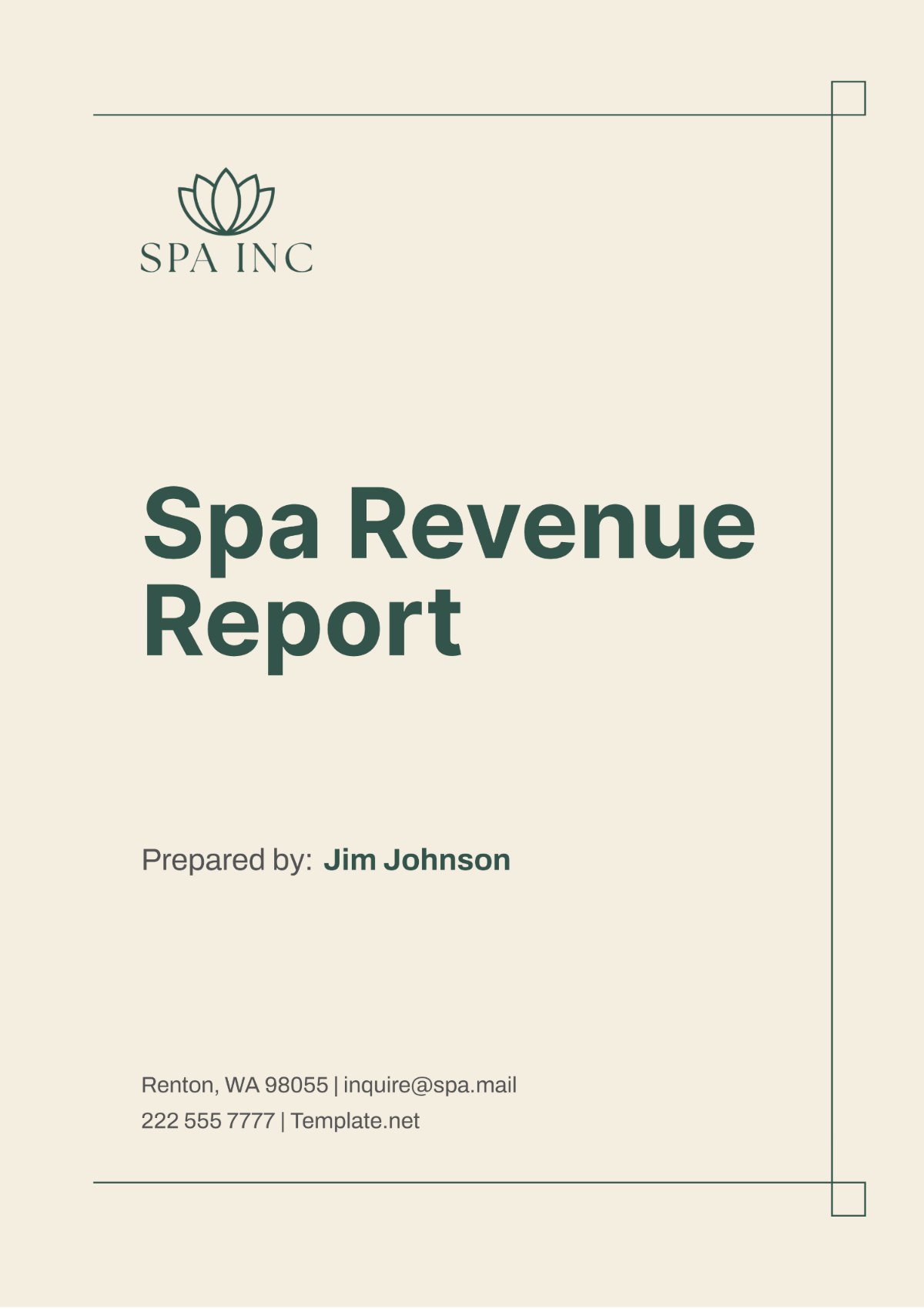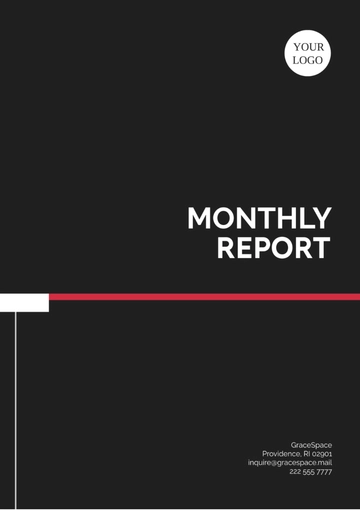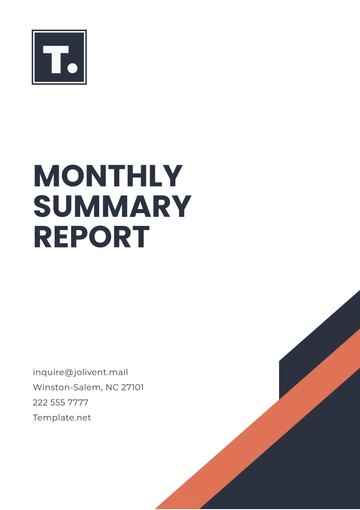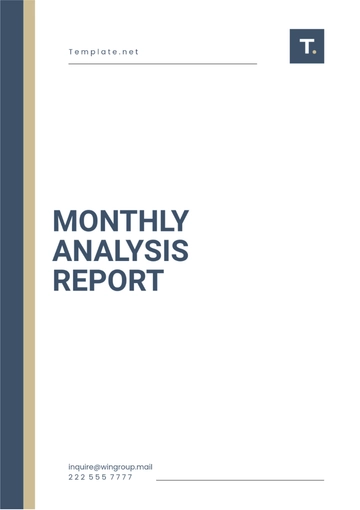Free Spa Revenue Report

I. Executive Summary
This Spa Revenue Report presents an in-depth analysis of our financial performance over the past fiscal year. Our focus is on understanding the sources of our revenue, identifying trends, and making strategic recommendations for future growth. The report highlights key revenue drivers, customer metrics, and potential areas for improvement.
Key Findings
Total Revenue: $720,000, a 20% increase from the previous year.
Top-Performing Service: Massages, contributing 42% of total revenue.
Highest-Growth Customer Segment: Membership clients, with a 30% increase in spending.
Revenue Growth: Steady increase across all service types and customer segments.
II. Revenue Overview
Our total revenue for the fiscal year reached $720,000, demonstrating significant growth and strong performance across all service categories. This section provides an overview of our total revenue and growth rates.
Category | Amount ($) |
|---|---|
Total Revenue | 720,000 |
Year-over-Year Growth | 20% |
The total revenue of $720,000 represents a 20% increase compared to the previous fiscal year. This growth is attributed to an increase in the number of clients, higher average spend per client, and successful marketing initiatives. Our strategic focus on enhancing service quality and customer experience has played a crucial role in achieving these results.
III. Revenue Breakdown
A. Service Type
Our revenue is generated from various service types, each contributing differently to our overall income. This section breaks down the revenue by service type, highlighting the most and least profitable services.
Service Type | Revenue ($) |
|---|---|
Massages | 300,000 |
Facials | 200,000 |
Body Treatments | 150,000 |
Retail Products | 70,000 |
Total Revenue | 720,000 |
Massages are the top-performing service, generating $300,000 and accounting for 42% of our total revenue. Facials and body treatments follow, contributing $200,000 and $150,000, respectively. Retail products have also shown strong performance with $70,000 in revenue, reflecting successful cross-selling strategies.
B. Customer Segment
Understanding our revenue by customer segment helps us identify which groups are the most valuable and how to tailor our services to meet their needs.
Customer Segment | Revenue ($) |
|---|---|
New Clients | 220,000 |
Repeat Clients | 300,000 |
Membership Clients | 200,000 |
Total Revenue | 720,000 |
Repeat clients are our largest revenue source, contributing $300,000, or 42% of the total revenue. New clients generated $220,000, highlighting the effectiveness of our acquisition strategies. Membership clients showed significant growth, with $200,000 in revenue, up 30% from the previous year, indicating the success of our membership programs.
C. Location
If applicable, breaking down revenue by location can reveal geographical trends and opportunities for expansion.
Location | Revenue ($) |
|---|---|
Main Branch | 500,000 |
Satellite Branch 1 | 150,000 |
Satellite Branch 2 | 70,000 |
Total Revenue | 720,000 |
The main branch remains the primary revenue generator with $500,000, while our satellite branches contributed $150,000 and $70,000 respectively. This distribution indicates strong performance at our main location and growing potential at satellite branches, suggesting opportunities for further investment and marketing efforts to boost their revenue.
IV. Revenue Trends
A. Quarterly Trends
Analyzing our revenue on a quarterly basis provides insights into seasonal patterns and helps identify areas for improvement.
Quarter | Revenue ($) |
|---|---|
Q1 | 150,000 |
Q2 | 180,000 |
Q3 | 200,000 |
Q4 | 190,000 |
Revenue increased steadily throughout the year, with Q3 showing the highest revenue of $200,000. Q2 also performed well, with $180,000, indicating strong demand during the spring and summer months. Q1 and Q4 were slightly lower, likely due to seasonal fluctuations and holiday periods.
B. Seasonal Trends
Identifying seasonal trends helps us optimize our marketing and service offerings to capitalize on peak demand periods.
Season | Revenue ($) |
|---|---|
Spring | 190,000 |
Summer | 210,000 |
Fall | 180,000 |
Winter | 140,000 |
Summer emerged as the strongest season, with $210,000 in revenue, followed by spring with $190,000. Fall and winter showed slightly lower revenue, indicating potential areas for targeted promotions or service adjustments to boost revenue during these seasons.
V. Revenue Per Service
Analyzing revenue per service type helps us understand the profitability of each service and allocate resources effectively.
Service Type | Revenue per Service ($) |
|---|---|
Massages | 60 |
Facials | 40 |
Body Treatments | 50 |
Retail Products | 30 |
Among our services, massages are the most profitable, with an average revenue per service of $60. Facials and body treatments follow with $40 and $50, respectively. Retail products have the lowest revenue per service at $30.
VI. Customer Metrics
Understanding our customer metrics helps us tailor our services and marketing strategies to meet customer needs and preferences.
Metric | Value |
|---|---|
New Client Acquisition | 500 |
Repeat Client Retention | 80% |
Membership Client Growth | 30% |
Average Spend per Client | 80 |
We acquired 500 new clients during the year, showcasing the effectiveness of our marketing efforts. Our repeat client retention rate of 80% indicates high customer satisfaction and loyalty. Membership client growth at 30% demonstrates the success of our membership programs in driving revenue. The average spend per client is $80, highlighting the value of our services to our customers.
VII. Comparative Analysis
Comparing our revenue performance with previous periods and industry benchmarks provides valuable insights into our competitive position and areas for improvement.
Comparison | Current Revenue ($) | Previous Period Revenue ($) | Industry Average Revenue ($) |
|---|---|---|---|
Total Revenue | 720,000 | 600,000 | - |
Year-over-Year Growth Rate | 20% | - | - |
Our total revenue of $720,000 represents a 20% increase from the previous period, outperforming our expectations. This growth is significantly higher than the industry average, indicating our competitive strength and effective revenue generation strategies. Moving forward, we aim to sustain this growth momentum and continue exceeding industry benchmarks.
VIII. Marketing and Sales Impact
Our marketing and sales efforts play a crucial role in driving revenue growth. This section highlights the impact of our initiatives on revenue performance.
Marketing Campaigns: Our targeted marketing campaigns resulted in a 15% increase in new client acquisitions.
Sales Promotions: Promotional offers and discounts led to a 25% increase in revenue from repeat clients.
Digital Marketing: Investment in digital marketing channels resulted in a 20% increase in online bookings.
IX. Future Revenue Projections
Based on our current performance and market trends, we have developed the following revenue projections for the next fiscal year.
Period | Projected Revenue ($) |
|---|---|
Next Fiscal Year | 850,000 |
Our future revenue projection of $850,000 reflects our confidence in our growth trajectory. This projection considers factors such as market demand, competitive landscape, and internal capabilities. To achieve this target, we will focus on expanding our service offerings, enhancing customer experience, and increasing our marketing efforts.
X. Recommendations
Based on our analysis, we recommend the following strategies to further improve our revenue performance:
Expand Service Offerings: Introduce new services or packages to attract a wider range of clients.
Enhance Customer Experience: Invest in staff training and customer service to improve client satisfaction and retention.
Increase Marketing Efforts: Implement targeted marketing campaigns to reach new clients and promote our services.
Leverage Technology: Use technology to streamline operations, improve efficiency, and enhance the booking experience for clients.
Monitor Performance: Continuously track and analyze revenue metrics to identify trends and adjust strategies accordingly.
- 100% Customizable, free editor
- Access 1 Million+ Templates, photo’s & graphics
- Download or share as a template
- Click and replace photos, graphics, text, backgrounds
- Resize, crop, AI write & more
- Access advanced editor
Track and analyze revenue effectively with the Spa Revenue Report Template from Template.net. This fully editable and customizable template helps you create detailed reports on spa revenue sources and trends. Edit in our AI Editor tool to customize the report to your spa's specific needs, providing clear insights into revenue performance for better decision-making.
You may also like
- Sales Report
- Daily Report
- Project Report
- Business Report
- Weekly Report
- Incident Report
- Annual Report
- Report Layout
- Report Design
- Progress Report
- Marketing Report
- Company Report
- Monthly Report
- Audit Report
- Status Report
- School Report
- Reports Hr
- Management Report
- Project Status Report
- Handover Report
- Health And Safety Report
- Restaurant Report
- Construction Report
- Research Report
- Evaluation Report
- Investigation Report
- Employee Report
- Advertising Report
- Weekly Status Report
- Project Management Report
- Finance Report
- Service Report
- Technical Report
- Meeting Report
- Quarterly Report
- Inspection Report
- Medical Report
- Test Report
- Summary Report
- Inventory Report
- Valuation Report
- Operations Report
- Payroll Report
- Training Report
- Job Report
- Case Report
- Performance Report
- Board Report
- Internal Audit Report
- Student Report
- Monthly Management Report
- Small Business Report
- Accident Report
- Call Center Report
- Activity Report
- IT and Software Report
- Internship Report
- Visit Report
- Product Report
- Book Report
- Property Report
- Recruitment Report
- University Report
- Event Report
- SEO Report
- Conference Report
- Narrative Report
- Nursing Home Report
- Preschool Report
- Call Report
- Customer Report
- Employee Incident Report
- Accomplishment Report
- Social Media Report
- Work From Home Report
- Security Report
- Damage Report
- Quality Report
- Internal Report
- Nurse Report
- Real Estate Report
- Hotel Report
- Equipment Report
- Credit Report
- Field Report
- Non Profit Report
- Maintenance Report
- News Report
- Survey Report
- Executive Report
- Law Firm Report
- Advertising Agency Report
- Interior Design Report
- Travel Agency Report
- Stock Report
- Salon Report
- Bug Report
- Workplace Report
- Action Report
- Investor Report
- Cleaning Services Report
- Consulting Report
- Freelancer Report
- Site Visit Report
- Trip Report
- Classroom Observation Report
- Vehicle Report
- Final Report
- Software Report





























